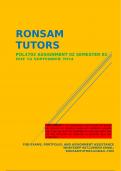Lecture 1
States
● Constitutional law is most often about a state (not always, can also be about international
organization, or the EU for example)
● Different dimensions of the word 'state'
○ State as a (political) community > nation
○ State as a territory > piece of land (geographical)
○ State as in 'government' (relevant for constitutional law)
○ State as the central government (a specific kind of government, opposed to provinces
+ municipalities)
■ constitutional law refers to a central government
● Can a micro-nation also be a state (e.g. Molossia)? Who should recognize a micro-nation for
it to be a state?
○ Some micro-nations originate from liberation movements. If we require the
recognition of the occupying state, it becomes very hard for a new state to set itself
apart from the 'original' occupying state
○ Problem with former colonial regions/areas (e.g. Dutch Caribbean Islands)
○ Occupying country/state becomes a 'veto' player
● Montevideo Convention and its requirements of a state's recognition
○ Population
○ Territory
○ Government (?) > effective authority
○ Capacity to enter into relations with other states
● Complication = even if the recognition by other states is not necessary for achieving
statehood, recognition by other countries is practically necessary for a state to function, it
depends on this recognition
● Effective authority/government is essential criterium for a state and its recognition
Effective authority
● Example = FIFA as a state within a state
○ Made arrangements with the Brazilian state
○ Had the power to decide who could come to the stadium or not
○ Made exceptions for the prohibition of drinking (and tax exemptions) for FIFA's
sponsors
■ change in Brazilian legislation (sign of effective power)!?!?
○ Is FIFA a state (in terms of effective authority)?
■ Brazil no longer able to effect its authority regarding FIFA matters, since FIFA
makes its own legislation
■ However, based on a contractual agreement
■ Answer is no: even though FIFA had huge powers in practice they didn't have
any monopoly (e.g. on violence or power)
■ Besides a state needs sources of legitimacy
Sources of legitimacy
● Main sources of legitimacy according to Max weber
○ Tradition
○ Charisma
○ Legality/procedure (input, throughout legitimacy) > relevant for this
course/constitutional law
○ Outcome legitimacy (added to Weber later on) > effectiveness of a policy or certain
decision
, ● Problem with legality/procedural legitimacy = procedures in themselves should be legitimate
as well
● Constitutions play a role in providing legitimacy for a state, but where do constitutions get
here legitimacy from (the constitutional dilemma)
● Also from procedure
● But the very first constitutions were not established according to certain procedures
○ They get there legitimacy from external factors, such as 1. tradition, 2. outcome
legitimacy, 3. principles such as democracy and the rule of law
○ Lex iniusta non est lex (an unjust constitution is no constitution)
○ The constitution legitimizes all other sorts of law (criminal, private), but it cannot
legitimize itself
Function of Constitutions
● Citizens give authority to institutions who can exercise this authority over citizens on the basis
of the constitution???
● Constitutions provide a narrative for the political community/the people
● Main functions of constitutions (according to Foremans??)
○ Establish the power of institutions
○ Regulating these power (through procedure)
○ Limiting these powers
○ These three factors legitimize authority
● Constitutions are a symbol of a specific identity (the people) (according to Hensel)
○ How does this relate to the legal notion of 'constitution'
● Different dimensions of constitutions
○ The political dimension (Hensel) > liberal-democratic, communist, theocratic etc.
■ We can categorize the constitutions according to their ideology
■ Can we compare constitutions across different categories (communist vs
democratic)?
○ The legal-formal dimension > our idea of 'the constitution'
■ The (foundational) document itself (e.g. basic law) setting out certain rights
and freedoms of governments
○ The legal-substantive dimension > the case when there is no written constitution like
the basic law
■ Unwritten body of rules setting out rights (e.g. in the UK)
■ When the constitutional documents are not collected in one bill (e.g. Canada)
■ Body of rules and (unwritten) norms aimed at constituting and limiting
governmental powers
● Relationship between the three dimensions = both the political dimension and the legal-formal
dimension operate in the structure of the legal-substantive dimension??
The legal-formal dimension is also carried by the political/constitutional culture (political
dimension)
● When studying the legal-formal dimension, it's important to take into account the broader
political culture of the state (political dimension)
Why comparative law?
● Functions of engaging in comparative constitutional law
○ We all have the same problems + ambitions > look to other states to validate this
statements and to investigate how they solved these problems/met these ambitions
○ CCL provides useful material for legal design (constitutional engineering)
○ CCL also provides a framework, a common language, to discuss common problems
in the struggle for freedom & security
, ○ CCL aids the development of new (transnational) structures (e.g. UN, EU), to set up
their own structures (constitutional borrowing)
○ CCL helps us to better understand our own system (educational aim)
Approaches to comparative law
● Classification
○ Classify constitutions into legal families
■ Common law (Anglo-American) vs. civil law (Roman)
■ Presidential vs. parliamentary systems
■ Judicial review vs. parliamentary sovereignty
● Expressivism
○ We try to establish the constitutional identity of a certain constitution
○ Which values underpin this constitution (e.g. liberal or communist?)
○ Focused on the differences between constitutions
● Universalism
○ Look at shared values identified across the globe (e.g. human dignity?)
○ Are there universal aspects about constitutions (e.g. proportionality)
○ Bernard Schlink argued that in the US proportionality is a universal part of the legal
system????
● Functionalism
○ Look at how constitutions can offer solutions to common problems
○ Compare constitutions in how they solve certain problems
○ Identifying problems is necessary and crucial part
○ Most used in CCL
Functionalism
● Part of 'constitutional engineering'
○ 1st step: defining common problem
○ 2nd step: considering different doctrinal solutions proposed by different courts
○ 3d step: passing a considered judgment on the best approaches
● Problems with functionalism (Bricolage) =
1. Specific solution can be part of a specific cultural/historical context that might not be in place
in our own system
○ Legal transplants = transplanting a solution into a different legal system > fails
2. Specific arrangements are designed to meet a specific problem
○ Assumption = a legislator could choose out of every option and chose the best one
○ Reality = a lot of solutions are coincidental (borrowing what is readily at hand), its
choice was also influenced by limits imposed by legal system. Not all solutions were
considered > being bricoleurs (instead of engineers)
This displaces the emphasis on constitutional unity and compromise
● Solution = decontextualize the solution (from the system). It is important to consider more
solutions to the problem (to assemble a senseful and overarching constitutional design)
Normative framework of Constitutional Law (Democracy & Rule of Law)
● Liberal democracy and its constitution derive their legitimacy from democratic principles such
as the rule of law
● Principles are:
○ Democratic when they establish the government to be a government of the people, by
the people and for the people
○ Liberal due to principle such as the Rule of Law
States
● Constitutional law is most often about a state (not always, can also be about international
organization, or the EU for example)
● Different dimensions of the word 'state'
○ State as a (political) community > nation
○ State as a territory > piece of land (geographical)
○ State as in 'government' (relevant for constitutional law)
○ State as the central government (a specific kind of government, opposed to provinces
+ municipalities)
■ constitutional law refers to a central government
● Can a micro-nation also be a state (e.g. Molossia)? Who should recognize a micro-nation for
it to be a state?
○ Some micro-nations originate from liberation movements. If we require the
recognition of the occupying state, it becomes very hard for a new state to set itself
apart from the 'original' occupying state
○ Problem with former colonial regions/areas (e.g. Dutch Caribbean Islands)
○ Occupying country/state becomes a 'veto' player
● Montevideo Convention and its requirements of a state's recognition
○ Population
○ Territory
○ Government (?) > effective authority
○ Capacity to enter into relations with other states
● Complication = even if the recognition by other states is not necessary for achieving
statehood, recognition by other countries is practically necessary for a state to function, it
depends on this recognition
● Effective authority/government is essential criterium for a state and its recognition
Effective authority
● Example = FIFA as a state within a state
○ Made arrangements with the Brazilian state
○ Had the power to decide who could come to the stadium or not
○ Made exceptions for the prohibition of drinking (and tax exemptions) for FIFA's
sponsors
■ change in Brazilian legislation (sign of effective power)!?!?
○ Is FIFA a state (in terms of effective authority)?
■ Brazil no longer able to effect its authority regarding FIFA matters, since FIFA
makes its own legislation
■ However, based on a contractual agreement
■ Answer is no: even though FIFA had huge powers in practice they didn't have
any monopoly (e.g. on violence or power)
■ Besides a state needs sources of legitimacy
Sources of legitimacy
● Main sources of legitimacy according to Max weber
○ Tradition
○ Charisma
○ Legality/procedure (input, throughout legitimacy) > relevant for this
course/constitutional law
○ Outcome legitimacy (added to Weber later on) > effectiveness of a policy or certain
decision
, ● Problem with legality/procedural legitimacy = procedures in themselves should be legitimate
as well
● Constitutions play a role in providing legitimacy for a state, but where do constitutions get
here legitimacy from (the constitutional dilemma)
● Also from procedure
● But the very first constitutions were not established according to certain procedures
○ They get there legitimacy from external factors, such as 1. tradition, 2. outcome
legitimacy, 3. principles such as democracy and the rule of law
○ Lex iniusta non est lex (an unjust constitution is no constitution)
○ The constitution legitimizes all other sorts of law (criminal, private), but it cannot
legitimize itself
Function of Constitutions
● Citizens give authority to institutions who can exercise this authority over citizens on the basis
of the constitution???
● Constitutions provide a narrative for the political community/the people
● Main functions of constitutions (according to Foremans??)
○ Establish the power of institutions
○ Regulating these power (through procedure)
○ Limiting these powers
○ These three factors legitimize authority
● Constitutions are a symbol of a specific identity (the people) (according to Hensel)
○ How does this relate to the legal notion of 'constitution'
● Different dimensions of constitutions
○ The political dimension (Hensel) > liberal-democratic, communist, theocratic etc.
■ We can categorize the constitutions according to their ideology
■ Can we compare constitutions across different categories (communist vs
democratic)?
○ The legal-formal dimension > our idea of 'the constitution'
■ The (foundational) document itself (e.g. basic law) setting out certain rights
and freedoms of governments
○ The legal-substantive dimension > the case when there is no written constitution like
the basic law
■ Unwritten body of rules setting out rights (e.g. in the UK)
■ When the constitutional documents are not collected in one bill (e.g. Canada)
■ Body of rules and (unwritten) norms aimed at constituting and limiting
governmental powers
● Relationship between the three dimensions = both the political dimension and the legal-formal
dimension operate in the structure of the legal-substantive dimension??
The legal-formal dimension is also carried by the political/constitutional culture (political
dimension)
● When studying the legal-formal dimension, it's important to take into account the broader
political culture of the state (political dimension)
Why comparative law?
● Functions of engaging in comparative constitutional law
○ We all have the same problems + ambitions > look to other states to validate this
statements and to investigate how they solved these problems/met these ambitions
○ CCL provides useful material for legal design (constitutional engineering)
○ CCL also provides a framework, a common language, to discuss common problems
in the struggle for freedom & security
, ○ CCL aids the development of new (transnational) structures (e.g. UN, EU), to set up
their own structures (constitutional borrowing)
○ CCL helps us to better understand our own system (educational aim)
Approaches to comparative law
● Classification
○ Classify constitutions into legal families
■ Common law (Anglo-American) vs. civil law (Roman)
■ Presidential vs. parliamentary systems
■ Judicial review vs. parliamentary sovereignty
● Expressivism
○ We try to establish the constitutional identity of a certain constitution
○ Which values underpin this constitution (e.g. liberal or communist?)
○ Focused on the differences between constitutions
● Universalism
○ Look at shared values identified across the globe (e.g. human dignity?)
○ Are there universal aspects about constitutions (e.g. proportionality)
○ Bernard Schlink argued that in the US proportionality is a universal part of the legal
system????
● Functionalism
○ Look at how constitutions can offer solutions to common problems
○ Compare constitutions in how they solve certain problems
○ Identifying problems is necessary and crucial part
○ Most used in CCL
Functionalism
● Part of 'constitutional engineering'
○ 1st step: defining common problem
○ 2nd step: considering different doctrinal solutions proposed by different courts
○ 3d step: passing a considered judgment on the best approaches
● Problems with functionalism (Bricolage) =
1. Specific solution can be part of a specific cultural/historical context that might not be in place
in our own system
○ Legal transplants = transplanting a solution into a different legal system > fails
2. Specific arrangements are designed to meet a specific problem
○ Assumption = a legislator could choose out of every option and chose the best one
○ Reality = a lot of solutions are coincidental (borrowing what is readily at hand), its
choice was also influenced by limits imposed by legal system. Not all solutions were
considered > being bricoleurs (instead of engineers)
This displaces the emphasis on constitutional unity and compromise
● Solution = decontextualize the solution (from the system). It is important to consider more
solutions to the problem (to assemble a senseful and overarching constitutional design)
Normative framework of Constitutional Law (Democracy & Rule of Law)
● Liberal democracy and its constitution derive their legitimacy from democratic principles such
as the rule of law
● Principles are:
○ Democratic when they establish the government to be a government of the people, by
the people and for the people
○ Liberal due to principle such as the Rule of Law











